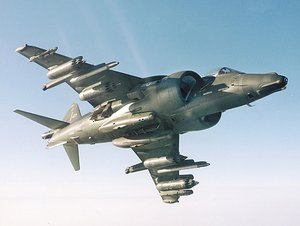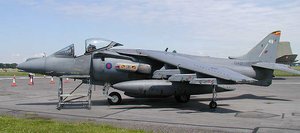RAF Harrier II
|
|
| AV-8 Harrier II | ||
|---|---|---|
 RAF Harrier GR7 | ||
| Description | ||
| Role | Attack aircraft | |
| Crew | 1 or 2 | |
| First Flight | November 9 1978 | |
| Entered Service | GR5: July 1 1987 | |
| Manufacturer | BAE Systems (UK versions) | |
| Dimensions | ||
| Length | 46 ft 4 in | 14.1 m |
| Wingspan | 30 ft 4 in | 9.2 m |
| Height | 11 ft 9 in | 3.5 m |
| Wing Area | ft² | m² |
| Weights | ||
| Empty | 12,500 lb | 5,700 kg |
| Loaded | lb | kg |
| Maximum Takeoff | lb | kg |
| Capacity | ||
| Powerplant | ||
| Engines | GR7/GR9 : One Rolls-Royce Pegasus 105 GR7A/GR9A: One Rolls-Royce Pegasus 107 | |
| Thrust | lbf | kN |
| Performance | ||
| Maximum Speed | 661 mph | 1,065 km/h |
| Combat Range | miles | km |
| Ferry Range | miles | km |
| Service Ceiling | 50,000 ft | 15,000 m |
| Rate of Climb | ft/min | m/min |
| Wing Loading | lb/ft² | kg/m² |
| Thrust/Weight | ||
| Power/Mass | hp/lb | kW/kg |
| Avionics | ||
| Avionics | ||
| Armament | ||
| Guns | ||
| Bombs | Paveway 2, Paveway 3 and general purpose bombs | |
| Missiles | Maverick, Brimstone, Storm Shadow, Sidewinder, ASRAAM | |
| Rockets | CRV-7 | |
| Other | ||
The Harrier GR5, GR7, GR7A, GR9 and GR9A are all Royal Air Force variants of the BAE Systems/Boeing Harrier II.
The programme is a joint development between BAE and Boeing (initially British Aerospace and McDonnell Douglas). For UK variants BAE is the prime contractor and Boeing sub-contractor while for the USMC AV-8 Harrier II variants Boeing is prime contractor and BAE sub-contractor. However, the Harrier II was originally developed primarily by McDonnell Douglas and the GR7 and GR9 are license-built versions of the U.S. version, respectively the AV-8B Harrier II and AV-8B+ Harrier II Plus. The RAF currently has no equivalent of the Harrier II Plus Night Attack.
The Harrier II is an extensively modified version of the first generation Hawker Siddeley Harrier GR Mk.1/Mk.3 series which first flew in December, 1967. The original aluminium alloy fuselage was replaced by a fuselage which makes extensive use of composites, providing significant weight reduction, increased payload/range. A totally new one piece wing provides around 14 per cent more area and increased thickness.
Unlike the Harrier II plus upgrade the RAF have chosen not to integrate a radar into its aircraft, which would give them an Beyond Visual Range Air-to-Air Missile (BVRAAM) capability. The primary air-to-air missile (AAM) of the AV-8B+ is the AIM-120 AMRAAM using its APG-65 radar. With the retirement of the Sea Harrier it has been suggested that its Blue Vixen radar could be transferred to the GR9 fleet however the Ministry of Defence has rejected this as risky and too expensive, Defence Minister Adam Ingram estimated the cost would be in excess of £600m.†
| Contents |
Variants
GR5
The GR5 was the RAF's first 2nd generation Harrier with development beginning in 1976. Two AV-8As were modified to Harrier II standard in 1979 and operated as development aircraft. The first BAe built development GR5 flew for the first time on April 30, 1985 and the aircraft entered service in July 1987. The GR5 differed from the USMC AV-8B in many subtle ways, for example avionics fit, weapons and countermeasures. Forty one GR5s were built.
GR5A
The GR5A was a minor variant of the Harrier which incorporated changes in the design in anticipation of the GR7 upgrade. Twenty one GR5As were built.
GR7
The GR7 had its maiden flight in May 1990 and made its first operational deployment in August 1995 over the former Yugoslavia. While the GR7 deployed on Invincible class aircraft carriers during testing as early as June 1994, the first operational deployments at sea began in 1997. This arrangement was formalised with the Joint Force Harrier, operating with the Royal Navy's Sea Harrier.
The GR7 formed the spearhead of the RAF's contribution to Operation Allied Force, the NATO mission in Kosovo. During this campaign the RAF identified significant shortcomings in its current arsenal. As a result the service ordered the AGM-65 Maverick stand off missile and the Enhanced Paveway which incorporates GPS guidance which would negate the effects of smoke and bad weather. Using the more updated ordnance as well as unguided iron and cluster munitions, RAF GR7's played a prominent role in Operation Telic, the UK contribution to the U.S.-led war against Iraq in 2003. RAF GR7's participated in strike and close air support missions throughout the conflict.
GR7A
The GR7A is the first stage in an upgrade to the Harrier GR9 standard. The GR7A is the GR7 with an uprated Rolls-Royce Pegasus 107 engine. When upgraded to GR9 standard the uprated engine variants will retain the A designation, becoming GR9As. Forty GR7s are due to receive this upgrade. The Mk 107 engine provides around 3,000 lbf (13 kN) extra thrust than the Mk 105's 21,750 lbf (98 kN) thrust, increasing aircraft performance during "hot and high" and carrier borne operations.
GR9
The Harrier GR9 is an avionics and weapons upgrade of the standard GR7. This upgrade, known as the Integrated Weapons programme (IWP), allows the carriage of the latest smart weapons, new inertial navigation and Global Positioning systems (INS/GPS). The new weapons being integrated are the Storm Shadow, Brimstone and Maverick missiles (fleetwide).
GR9A
The Harrier GR9A is an avionics and weapons upgrade of the uprated engined GR7As.
T10
The Harrier T10 is the original two seat training variant of the second generation RAF Harrier. The RAF considered upgrading the 1st generation Harrier trainer, the T4, to Harrier II standard. However due to the age of the airframes and the level of modification required the service decided to order new build Harrier II trainers. The RAF used the USMC trainer, the TAV-8B, as the basis for the design. Unlike their American counterparts the T10s are fully combat capable. Thirteen aircraft were built.
T12
With the upgrades applied to the GR7s to GR9 standard the RAF requires representative trainers. These aircraft will be the T12, the T10s with the IWS upgrade.
Units using the Harrier II
Royal Air Force
- No. 1 Squadron
- No. 3 Squadron
- No. 4 Squadron
- No. 20 Squadron
- RAF SAOEU Strike Attack Operational Evaluation Unit
United States Marine Corps
- VMA-211
- VMA-214
- VMA-223
- VMA-231
- VMA-311
- VMA-513
- VMA-542
Future
With the withdrawal of the Royal Navy's Sea Harrier by 2006 the RAF's Harrier fleet will be tasked with the missions it currently shares with those aircraft. The GR9 is expected to stay in service at least until 2015, when the first F-35s are due. At this point the JSF force should be gaining an initial operational capability (IOC).
Sources
† House of Commons Hansard, Written Answers, January 5 2004 [1] (http://www.publications.parliament.uk/pa/cm200304/cmhansrd/cm040105/text/40105w06.htm#40105w06.html_sbhd8)
| Variants | ||
|---|---|---|
| Hawker Siddeley Harrier - BAE Sea Harrier - RAF Harrier II - AV-8B Harrier II | ||
|
Lists of Aircraft | Aircraft manufacturers | Aircraft engines | Aircraft engine manufacturers Airports | Airlines | Air forces | Aircraft weapons | Missiles | Timeline of aviation |

